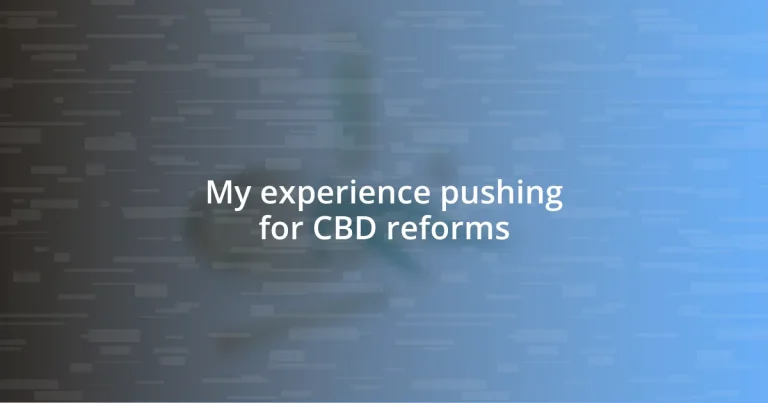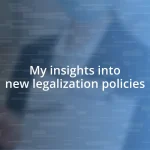Key takeaways:
- The legal landscape of CBD is fragmented, with federal laws allowing hemp-derived CBD but states imposing varying restrictions, complicating access and availability for consumers.
- Building a coalition of diverse stakeholders, including farmers, consumers, and policymakers, is essential for effective advocacy and enabling meaningful reforms in the CBD sector.
- Celebrating small victories and fostering community engagement are crucial for maintaining momentum and inspiring further action towards comprehensive CBD regulations.
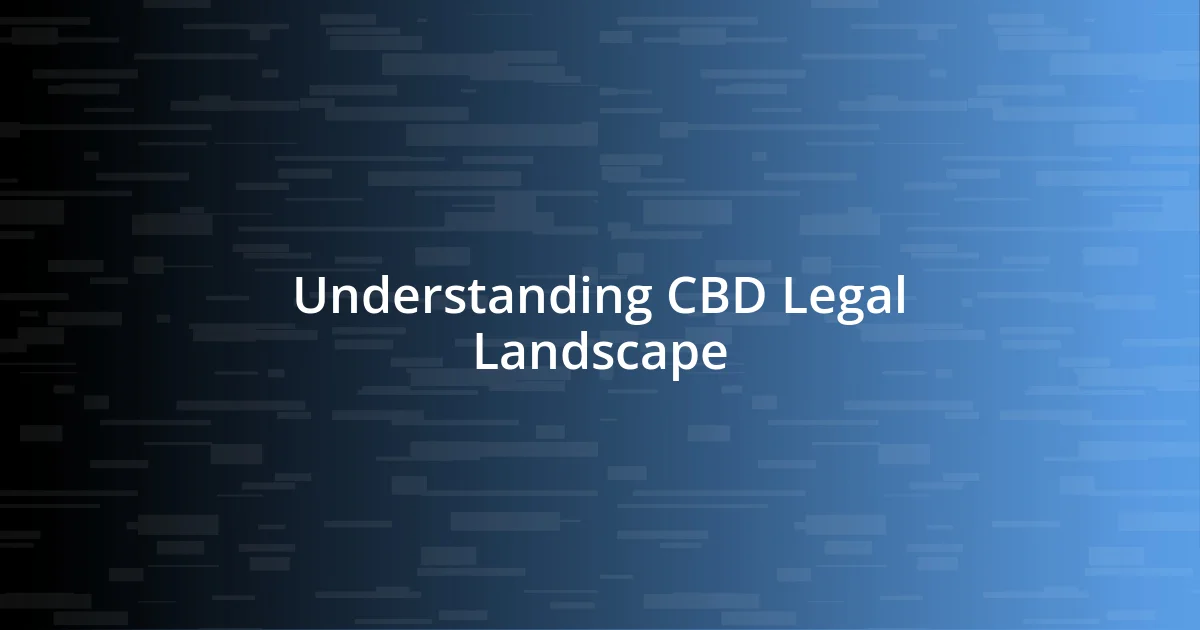
Understanding CBD Legal Landscape
The legal landscape of CBD is complex and constantly evolving. I remember attending a local panel discussion where industry experts expressed their frustrations over the lack of clear regulations. Isn’t it puzzling how something so widely used can exist in this gray area, leaving consumers and businesses alike in a state of confusion?
Navigating the maze of federal and state laws can feel overwhelming. For instance, when I first started advocating for CBD reforms, I discovered that while the federal government legalized hemp-derived CBD with the 2018 Farm Bill, individual states have the power to impose their own restrictions. This patchwork of regulations means what’s legal in one state could be illegal in another—how unfair is that for those seeking potential health benefits?
As I delved deeper into the issue, I realized that the regulatory inconsistencies not only hamper the growth of the industry but also prevent consumers from accessing quality products. It’s frustrating to think that, despite countless studies showing the potential benefits of CBD, legal uncertainties hinder its availability. Wouldn’t it be beneficial for everyone if there were a clear, consistent framework across all states?
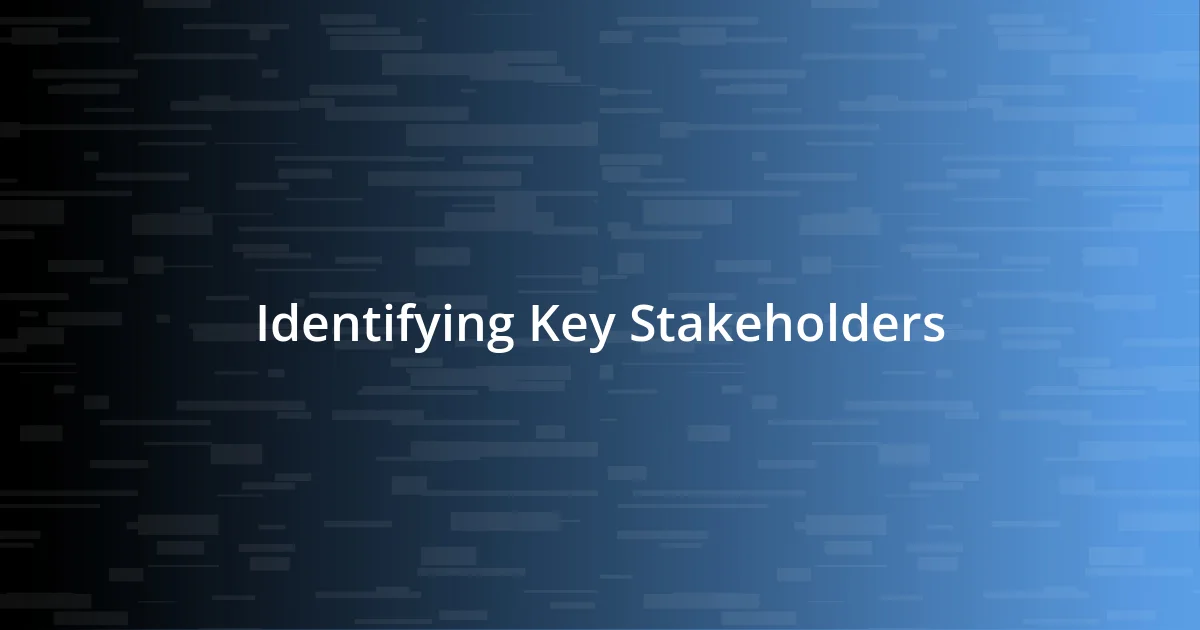
Identifying Key Stakeholders
Identifying the key stakeholders in the CBD reform movement is crucial for effective advocacy. From my own experience, I’ve found that local farmers and producers play a vital role. They often hold firsthand knowledge about the challenges of existing regulations. Listening to their stories of compliance struggles and market barriers really opened my eyes to the need for reform.
Additionally, consumers are powerful stakeholders whose voices must be heard. I recall attending a community meeting where advocates shared personal testimonies about how CBD helped manage their health conditions. Their passion and urgency highlighted the human impact of regulatory constraints. This drives home the point that reform isn’t just about legislation; it’s about improving lives.
Lastly, policymakers and industry organizations are significant players in this space. They wield the power to create change, yet often lack the real-world insights that can guide their decisions. It’s essential to engage them with the stories of those affected by the current landscape. By fostering dialogue among these groups, we can better advocate for meaningful change.
| Stakeholder Category | Role in Advocacy |
|---|---|
| Local Farmers & Producers | Provide insights on regulation challenges and compliance |
| Consumers | Share personal experiences to highlight the need for access |
| Policymakers & Industry Organizations | Create and influence regulations based on real-world insights |
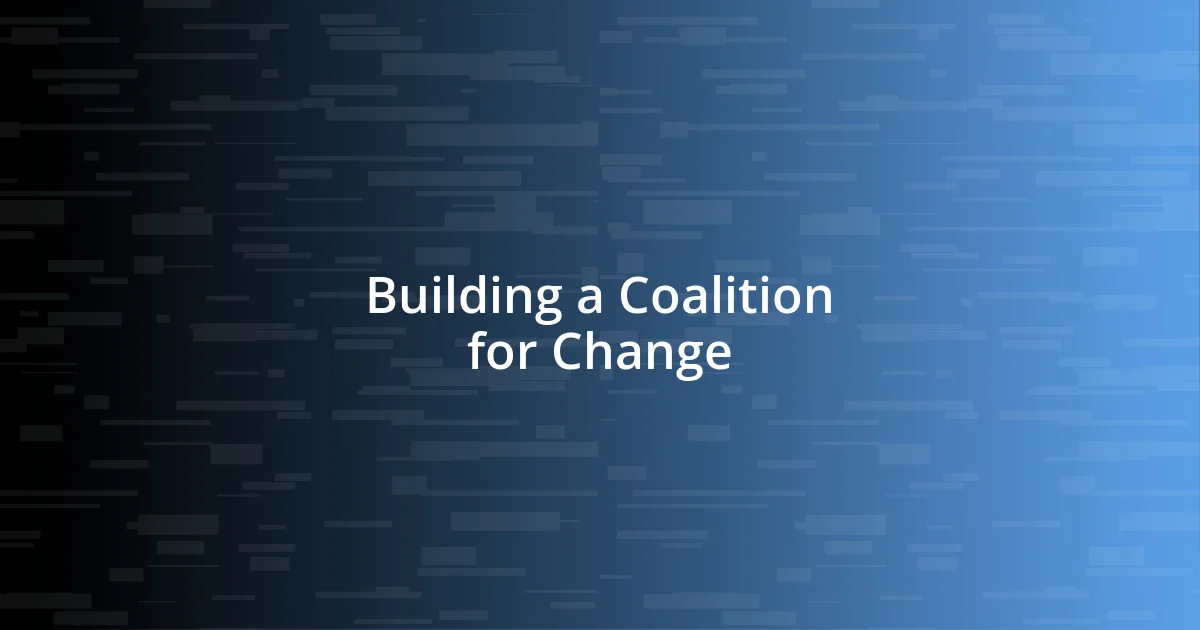
Building a Coalition for Change
Building a coalition for change in the CBD space is about uniting diverse voices and fostering collaboration. I recall a moment when I gathered a group of advocates, each representing different facets of the CBD landscape—from health professionals to business owners. Seeing these individuals share their unique perspectives was eye-opening. We realized that while we came from different backgrounds, we all shared a common goal: access to safe and effective CBD products. Building that coalition ignited a palpable energy, reminding me of how collective action amplifies our impact.
To strengthen our coalition, here are some key strategies we implemented:
- Regular Workshops: We hosted workshops to educate ourselves and the community on regulatory changes and advocacy techniques.
- Open Communication: Establishing a group chat allowed us to share timely updates and support.
- Inclusive Events: We held inclusive events where all stakeholders could voice their concerns and solutions in a safe environment.
- Partnerships: Collaborating with organizations already engaged in policy advocacy lent credibility to our efforts.
- Personal Stories: We shared testimonials—not just statistics—to humanize the urgency of reform and connect with more people emotionally.
Engaging with my coalition helped clarify our objectives and deepened my commitment to pushing for necessary reforms.
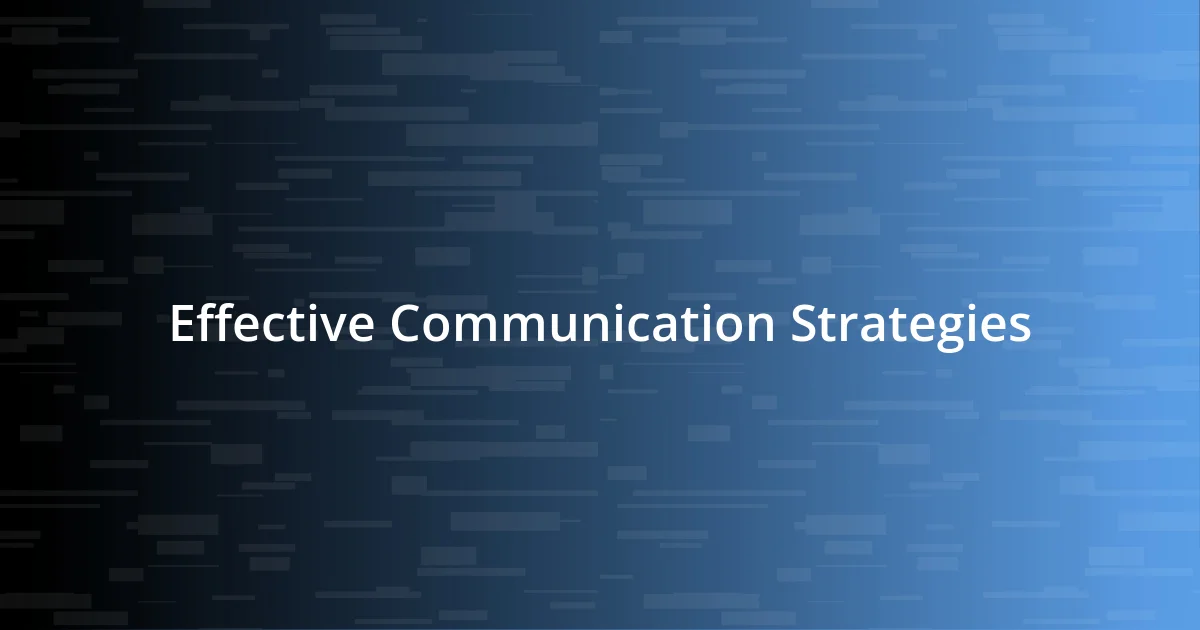
Effective Communication Strategies
Effective communication can make or break your advocacy efforts. In my journey, I discovered that tailoring messages to different stakeholders was essential. For instance, while attending a meeting with farmers, I shared tangible data on how regulatory changes could boost their profitability. Their eyes lit up, and I realized they responded better to concrete examples than to abstract concepts. Have you ever seen someone’s face change when they grasp what’s at stake? Those moments remind us of the importance of making our language resonate.
Another strategy that proved invaluable was active listening. During a public forum, I posed an open-ended question to the attendees about their biggest concerns regarding CBD access. The responses were insightful, revealing fears related to misinformation and stigma. It struck me how these sessions fostered a sense of community. I often found myself nodding along, not just as a facilitator, but as a fellow advocate. When people feel heard, they become more willing to engage, don’t you think?
Finally, I learned the power of storytelling in advocacy. I remember one particular afternoon sitting around a table with advocates sharing our experiences. One woman’s story about using CBD for her child’s seizure management brought a hush to the room. It was in that moment I grasped the visceral impact of our narratives. Those stories not only inform but also create emotional connections. They remind us all why we fight so passionately for change. If we can harness that emotional resonance, our advocacy becomes more than just a campaign; it becomes a shared mission.
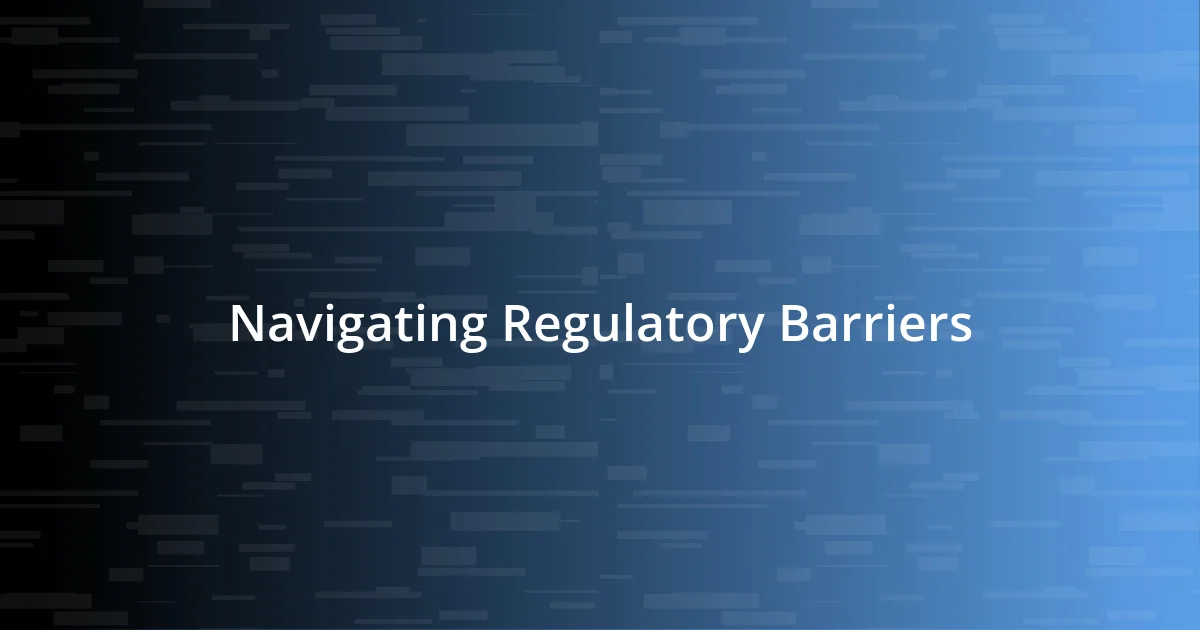
Navigating Regulatory Barriers
Navigating regulatory barriers in the CBD landscape can feel overwhelmingly complicated at times. I remember when I first approached local regulators to discuss the need for clearer guidelines. The conversations were often filled with confusion and frustration, which made me realize that many officials lacked adequate knowledge about CBD itself. How could we expect effective reforms if the people in charge weren’t fully informed? This line of questioning pushed me to focus on education as a foundational strategy.
In my experience, addressing these barriers meant building personal relationships with policymakers. One afternoon, I sat down with a state senator who seemed skeptical of CBD’s benefits. Instead of bombarding him with facts, I shared my journey and the positive impact CBD had on my life. He leaned in, intrigued—this anecdote opened a door to deeper dialogue. I learned that real change often starts with personal connections and authentic storytelling. To me, those moments were priceless because they transformed skepticism into understanding.
Moreover, I discovered the importance of keeping patience and resilience at the forefront. There were days when my efforts felt futile, and I questioned if anything would ever change. But each small win—like securing a meeting or getting feedback on our proposals—helped rekindle my hope. I often asked myself, “Isn’t persistence the key to unlocking these regulatory doors?” Those moments of reflection reminded me that navigating barriers is a marathon, not a sprint, and every step forward counts.
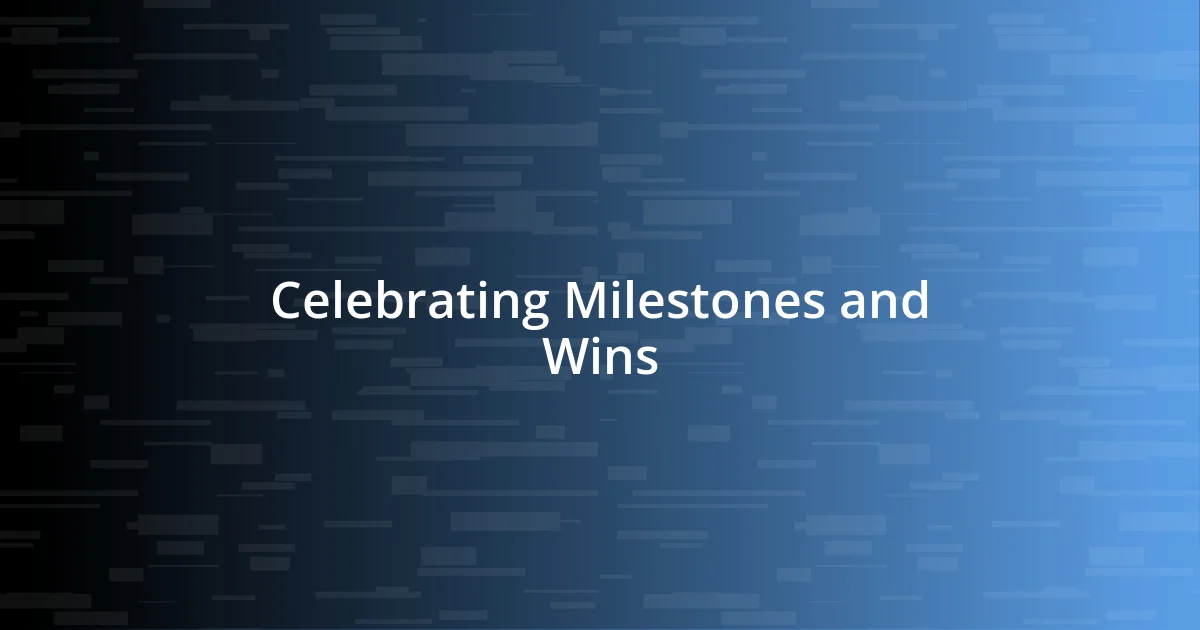
Celebrating Milestones and Wins
Reaching significant milestones in our push for CBD reforms often felt like climbing a mountain, but there were moments that made every struggle worthwhile. I vividly recall when a local health department finally adopted new guidelines; the ripple effect was immediate. The sense of accomplishment shared with our community was electric. It made me think, how often do we stop to celebrate these wins? In advocacy, acknowledging progress fuels motivation and inspires further action.
Another memorable occasion was when we celebrated the passing of a long-awaited bill. I organized a small gathering to honor everyone involved, a mix of advocates and community members. As we shared our stories and reflected on our joint efforts, a wave of gratitude washed over me. Have you ever felt that collective joy when a shared goal is achieved? It was in those moments that I truly realized the power of unity in advocacy. Celebrating our wins is not just a way to recognize achievements; it reinforces our commitment to the cause.
Every small victory counts, and I’ve learned that even minor achievements can shift the momentum. I remember a day when a prominent local retailer agreed to stock CBD products after a thorough discussion about their benefits. The initial excitement seemed small, but it sparked conversations in the community that led to greater interest and awareness. It made me reflect—what if we celebrated every step forward? Little victories create a cascade effect, building a stronger foundation for future reforms.
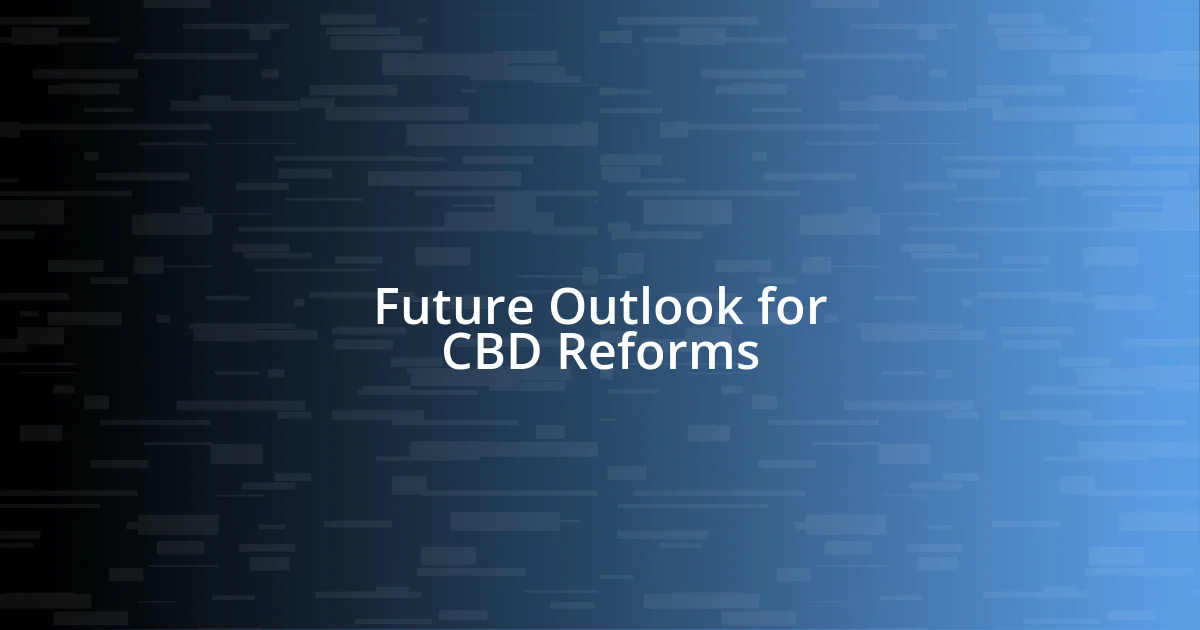
Future Outlook for CBD Reforms
As I look toward the future of CBD reforms, I can’t help but feel a mix of hope and determination. The momentum we’ve built recently is palpable, and I believe we’re on the cusp of significant changes. I often wonder, what new possibilities could emerge if we continue this path? It excites me to think about how education efforts and advocacy might finally pave the way for comprehensive regulations that protect consumers while fostering innovation in the industry.
One particularly inspiring experience was when I attended a recent conference that focused on CBD legislation. Seeing leaders from various sectors come together to share insights and brainstorm solutions was encouraging. It felt like we were part of a larger movement, and I couldn’t shake the feeling that we are entering a transformative phase. Who knows? Maybe the next big reform will come from a grassroots idea sparked during one of these collaborative discussions.
Looking ahead, I believe community engagement will be a cornerstone of future reforms. During my advocacy journey, I’ve seen firsthand how local voices can sway decisions. For instance, a community event I organized drew a diverse crowd, and the stories shared sparked genuine interest from local leaders. It made me realize that when people come together to share their experiences, they create a powerful narrative that can shift perceptions. Isn’t it fascinating how individual voices can resonate and lead to broader change? This, I believe, is the future of advocacy for CBD reforms—emphasizing the strength found in community connections and shared stories.












